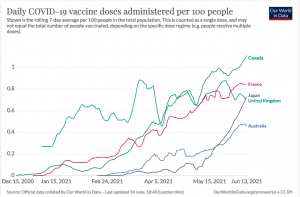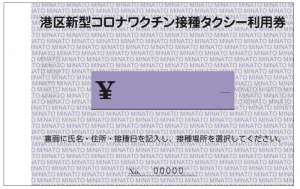
Vaccine rollout in different countries – Our World in Data
Despite a slow and lambasted start, Japan’s vaccination campaign has been picking up speed and is currently being carried out at a rate comparable to other developed nations (0.7 daily vaccine doses per 100 people for both Japan and the UK on 12 June according to Our World in Data), though it must still bridge the gap regarding its share of the vaccinated population (only 12.6% of Japanese people had received at least one dose on 10 June, against 60.5% in the UK and 43.9% in France).
While the Japanese central government has been responsible for acquiring and distributing vaccine doses, local authorities have been charged with carrying out the bulk of vaccinations.
Coupons and gifts for a jab
To encourage residents to get vaccinated, many local authorities have been offering gifts and incentives. For instance, Chiyoda Ward in Tokyo has been offering bath salts and energy drinks to people over 65 who took part in the vaccination programme, provided by local pharmaceutical companies. Many incentives however also aim to revitalise local businesses which have been severely hit by the pandemic. Yokosuka City, as another example, set up a campaign whereby vaccinated people are entitled to discounts at various local shops, including the shopping centre where its mass vaccination site was set up. Yamanashi Prefecture is set to offer a similar discount programme. Businesses in Fukuoka Prefecture have already announced similar measures, including free bottles of wine offered to vaccinated guests in hotels and 10% discounts at restaurants.
Other local authorities have chosen to offer coupons to people who get vaccinated, which can be redeemed in shops in the area. Miyashiro Town in Saitama Prefecture and Habikino City Chamber of Commerce and Industry, for example, have been offering gift cards worth ¥1,000 (approx. £6.45) and ¥2,000 (approx. £12.90) respectively.
Supporting local industries

Minato-ku taxi ticket ‘omote’, image source: Minato Ward website
Many municipalities have also started subsidising taxi rides to reach vulnerable or isolated residents and enable them to travel to a vaccination centre while supporting the taxi industry which has been struggling throughout the pandemic. Minato Ward in Tokyo for instance has been offering taxi tickets to its disabled residents which cover the entirety of the fares, while Akishima City in western Tokyo will pay for any excess fare over ¥500 (approx. £3.23).
Image source: Minato Ward website
Local government initiatives aiming to support local industries throughout the pandemic are not limited to the vaccination campaign. To help restaurants meet high standards of Covid safety measures, especially those most affected by restrictions, Chiba City has been offering subsidies. Such measures include using plastic wall partitions, thorough ventilation and a certain distance between tables. Certified restaurants are issued a sticker to display on their front window, which may help ease residents’ uncertainties and encourage them to eat out.
Businesses conversion in service of the vaccination effort
Japanese local government has been able to assist companies hardest hit by the pandemic by providing them with new revenue streams and employing their converted services for the vaccination effort. Such mutually beneficial partnerships include the Nippon Travel Agency which had previously been collaborating with municipalities on regional revitalisation projects. It now supports the vaccination rollout by providing call centres and an online booking platform.
At the time of writing, the Japanese government does not yet allow pharmacists to administer vaccines, although such plans are being examined. However, this does not mean the healthcare professionals cannot assist the vaccination effort, as shown by the pharmacies Welcia Holdings, Nihon Chouzai and Qol Holdings which have been providing their services to local authorities. Their pharmacists have been trained and dispatched to vaccination centres where they prepare vaccine syringes and assist people with the medical questionnaires they must fill out before being vaccinated.
Following a drop in operations of approximately 90% compared to pre-covid levels, Kokusai Kogyo, a sightseeing bus company based in the Tokyo area, offered to lend its vehicles to municipalities to assist with transporting residents, medical staff and materials to vaccination centres. After entering a partnership with five other bus companies nationwide, they will finally be supporting workplace vaccinations. This recent programme, set to start on 21 June, allows companies (as well as universities) to vaccinate their own employees and students, partly subsidised by the government. The bus companies will use their vehicles (buses, but also taxis and rental cars) to run shuttles to nearby train stations, transport medical staff and employees and use their largest buses as mobile vaccination clinics.
Newsletter photo copyright of Arne Müseler via Wikimedia Attribution-ShareAlike 3.0 Germany (CC BY-SA 3.0 DE)

